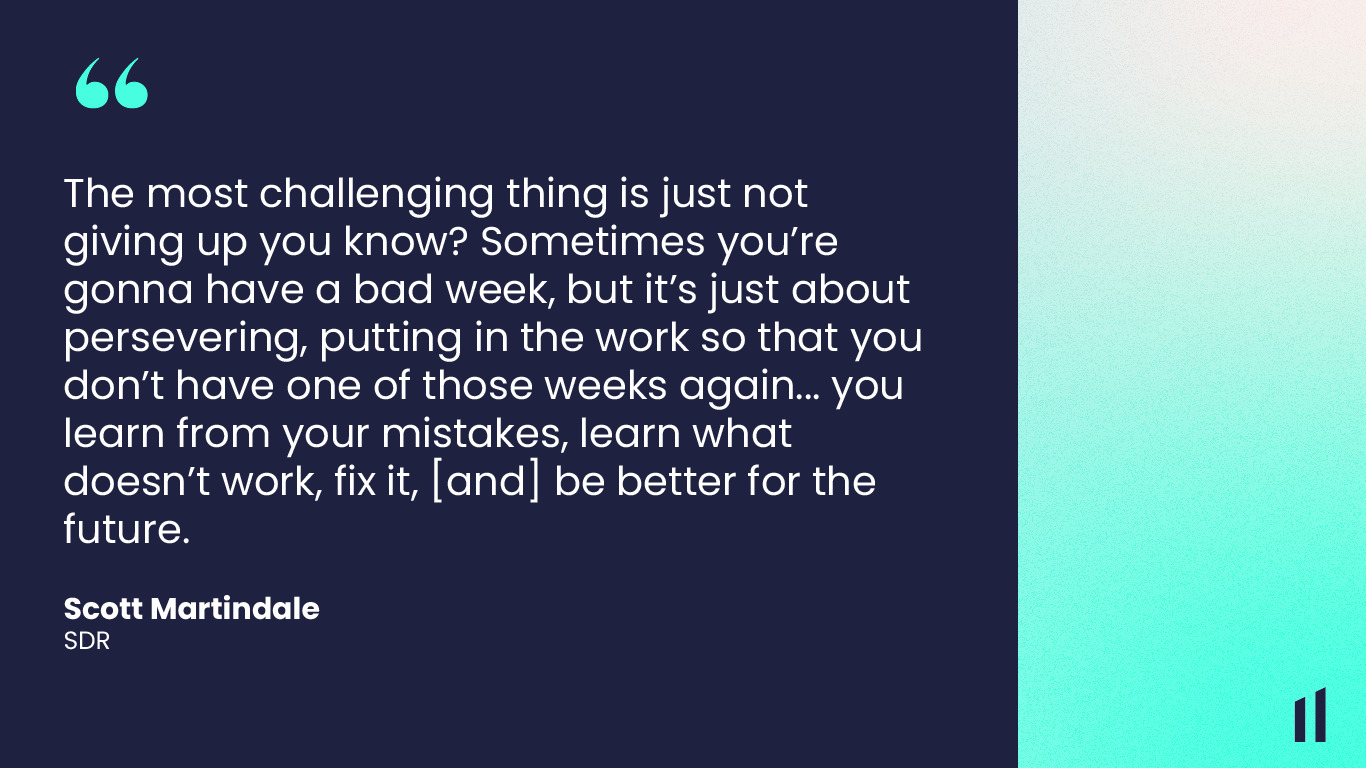Last updated on September 13th, 2023 at 06:56 pm
So you want to be an SDR?
Maybe the reputation of sales has scared you away?
Fear not. We’re here to guide you down the SDR career path with 5 reasons to start a career in sales.
It’s true sales can get a bad rep as difficult work. And we won’t lie to you, it’s not for everybody.
Yet, a career that begins as an SDR offers many benefits that go beyond making money.
The skills you’ll encounter along the SDR career path can give you the confidence to overcome challenges outside of work and propel you to other opportunities.
Let’s dive into those reasons now.
1. Develop key interpersonal skills
Imagine someone in sales.
They’re charismatic, right? You know, slick with words? They know how to read people?
Well, it’s true.
In order to work with people, you have to understand people. Success in sales depends on a few key interpersonal and communication skills.
The most successful salespeople are not only tuned into what motivates their prospects but also the pain points of their day-to-day work.
Only then can they begin a conversation where the buyer is interested in what they have to say.
Here are 3 of the most important interpersonal skills related to sales:
Empathy
Everyone’s favorite buzzword these days. People like it when you can see things from their perspective. By understanding how they live and feel, you’re better equipped to help them out.
Active Listening
Paying careful attention to what your prospect is saying with words (or body language) provides insight into how they act and makes you stand out from the crowd. Remember: interested people are interesting people.
Honesty
Being specific, transparent, and honest is how you build a healthy relationship. Honesty doesn’t waste time.
By showing some vulnerability with straightforward questions about topics you don’t understand, a prospect is more likely to trust you on those you do.
These soft skills are often required in an SDR career, but thankfully, they’re skills anyone can learn. Like any line of work, the more you practice the better you’ll get.
Your on-the-field interactions with prospects are the fertile ground to develop these critical interpersonal skills.
2. Cultivate business acumen
AKA business sense, business acumen is your complete understanding of business issues and the ability to use that knowledge towards an enterprise’s business objectives.
Basically, the art of the deal.
Some distinguishing traits of business acumen include:
- Decisiveness
- Foresight into the logistics of a choice (and how it affects everyone)
- Seeing the big picture of an organization
- A shrewd assessment of risks
Financial literacy is another trait that comes with a keen business sense.
Understanding the drivers of growth and how to create value are essential components of well-developed business acumen.
Naturally, sales at its core is business development.
By selling, you learn the ins and outs of what it takes to close a deal, even if you – as an SDR – aren’t closing.
As an SDR, you’ll learn more than the sales process. By prospecting, qualifying, and eventually attracting leads you’ll discover what a buyer looks like and how they make decisions.
Additionally, getting familiar with different industry pain points and learning how to maintain business relationships also fosters business acumen.
As you can see, this sales skill comes with the job.
3. Learn resilience
Among the many things you can expect in an SDR career, none are perhaps as likely as rejection.
Depending on how look at it (and ultimately take it), rejection doesn’t have to be a bad thing. Failure can be a wonderful teacher.
We asked one of our SDRs, Scott, for some of his thoughts on being resilient in this line of work.

SDRs can often be the face of an organization. They’re the vanguard and are the most likely to be told no.
With enough practice, good prospecting and qualifying leads will reduce the amount of rejection.
Enough experience in any customer-facing work will help you build social callouses to deal with all kinds of people.
But we live in an imperfect world. Rejection is a part of life for all SDRs.
Top SDRs learn how to manage these conflicts and develop strategies to maintain good relationships.
The life of an SDR has its challenges, but if those challenges are taken as opportunities to learn they’ll be easier to bear in the long run. They’ll also help you grow into a more determined person.
Progress comes from taking risks outside your comfort zone.
And few careers embody the progress of being rejected and moving on with your head held high than that of an SDR.
4. Become a subject matter expert
An SDR has to know what they’re talking about.
Today, salespeople are specialists who have an up-to-date understanding of what they sell and the market they’re selling to.
They also need to use their expertise to persuade. So not only are they an expert on a topic, they’re a convincing one.
This is the highly valuable blend of skill sets that come with being an SDR.
Often being a subject matter expert comes with extra benefits like a higher salary thanks to the niche qualifications and education that set you apart in the job market.
For example, let’s say you’re an SDR for a growing SaaS company.
The knowledge you’ll develop of your product and the SaaS industry at large is invaluable for your career.
Being a specialist is an inevitable result of becoming an SDR.
Your experience prospecting and selling to a specific audience of buyers will advance any career, especially in sales.
5. Build your network
Finally, an SDR career will introduce you to other professionals from a variety of backgrounds.
As we said, sales is people-oriented work.
You’ll be speaking to and working with a wide range of titles from entry-level specialists to C-level executives.
Expanding your network is an essential part of being an SDR. Through prospecting alone you’ll reach out to hundreds of contacts.
The added benefit of social selling on LinkedIn is that those contacts are saved to your network.
Ultimately, in your role as an SDR, you’ll be asking for referrals, organizing contacts, and building credibility through carefully researched outreach.
You don’t need us to remind you how valuable a strong network is for a career.
People and relationships are still the keys to building a body of experience and opportunity.
The skills here are just a few of the reasons to start a career as an SDR. If a career in sales sounds like a good fit for you, check out our careers page.
We’re always looking at applications, so apply today if you’re ready to take the next step down the SDR career path.




